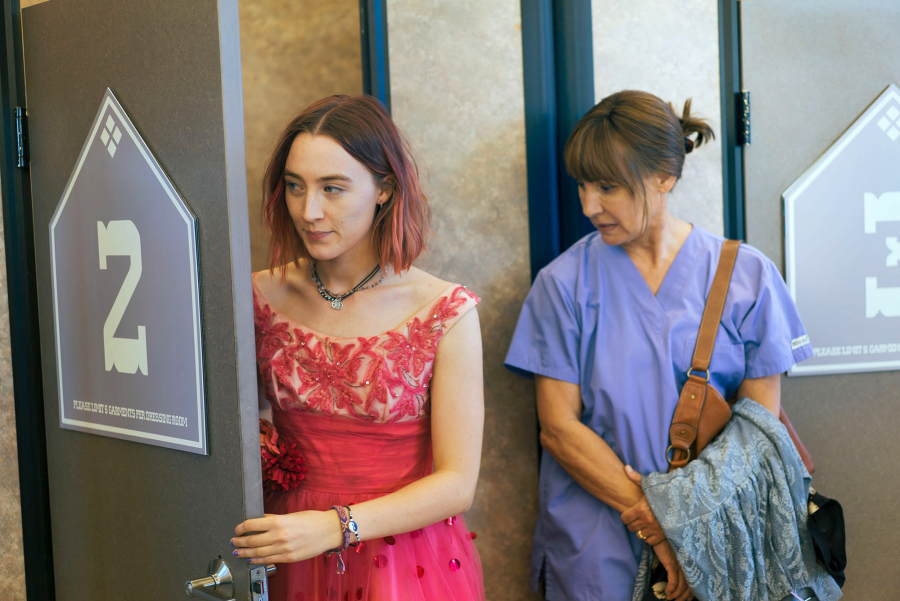American movies today are generally aimed at four different audiences: kids, adults, females and males. The coming-of-age screwball comedy “Lady Bird” crosses all those mutually exclusive boundaries to take us down novel, delightful paths.
While it’s focused on a high school senior looking forward with a touch of angst and confusion, this effervescently witty story about the life and times of Christine “Lady Bird” McPherson goes against most teen-movie conventions. It rejects Hollywood’s custom of painting each character in a single color. A rare delight of honesty and humor, like “Rushmore” and “Juno,” it covers the highs and lows and magic of teenage life and resonates in all directions.
The film is a dazzling collaboration between two of the most impressive art-house actresses of the past decade.
Saoirse Ronan plays the awkward but brilliant title character, a small-town girl aiming for something better.
Greta Gerwig moves behind the camera in her debut as solo writer/director, smoothly and effectively guiding the progress of fun, nostalgia, heartaches and optimism from start to finish. Neither has ever been better. I can’t recall many who have.
Lady Bird invented her own nickname (she considers it her given name because “I gave it to myself”). It suits her because she wants to fly away from California’s state capital, a stable, respectable community where she feels incurable claustrophobia. A lovable brat, she shares the viewpoint of the Joan Didion quote that fills the opening screen: “Anyone who talks about California hedonism has never spent a Christmas in Sacramento.” Lady Bird’s own snark comes in moaning critiques like “The only thing exciting about 2002 is that it’s a palindrome,” the sort of pessimistic punchline that Ronan delivers with dead-on accuracy.
Lady Bird hopes for a romance before her impending graduation from a small private Catholic school, where she pretends to be more sexually experienced than she is. She definitely wants a place at an East Coast liberal arts college; her guidance counselor bursts into laughter when she says she would prefer Yale. In any case, her nurse mother, who works two shifts, and her moderately employed father can’t afford any school outside of the state.
Although Lady Bird feels that “Sacramento is the Midwest of California,” it isn’t exactly barren. It’s where and how she lives there that makes her feel stuck in a rut and eager to uproot herself. Her family shops at thrift stores to find her high-quality clothes, and inhabits a humdrum house in a not especially appealing neighborhood. Actually living somewhere seems a privilege reserved for classmates whose parents own big homes with curb appeal. “How did I raise such a snob?” sighs her mother, who finds enough room in their home for Lady Bird’s unemployed older brother (Jordan Rodrigues) and his live-in girlfriend (Marielle Scott). That long-term guest notifies Lady Bird of the obvious: “Your mother has a big heart.”
Lady Bird’s mixed reaction to her parents (played by “Roseanne” and Broadway veteran Laurie Metcalf and Pulitzer-winning playwright Tracy Letts, who are flawlessly cast) and the religious upbringing they provided is part of the duality of who she is. She loves and fights with her mother. They both blink through tears when the audio version of “The Grapes of Wrath” reaches its touching conclusion during their car trip across town. “Let’s just sit with what we’ve heard,” mother suggests. “Are you serious?” is Lady Bird’s knee-jerk response, leading to a hilariously escalating battle that must be seen to be believed.
The dynamics at work within the lives of Lady Bird’s family and friends, the boys she carries a torch for, her mentors and the self-involved cool kids she wants to bond with are truly compelling. Some are buried under lost dreams with a subtle touch of melancholy. Lady Bird’s happiness is more often derived from seeing them live out their dream, rather than trying to impress them. It’s the sort of sweeping, uplifting emotional connection that can make you cry, like the climax of a John Steinbeck novel.



